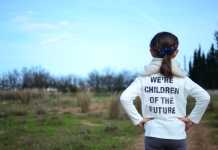“Can a person with brown skin marry a person with light skin?”
It was the last thing I was expecting to come out of my 6 year old’s mouth in the middle of the performance we were watching at the Saenger Theatre.
My first thought was “Oh my goodness, I’ve been failing as a parent. Why would he ever think it’s not ok?” We have had a lot of talks about differences in our house, differences in race, abilities, religions, parenting choices. How did I fail this one?
So I awkwardly blurted out “Of course they can!” Then I did quickly think to have a short conversation on the differences he was seeing in skin. I explained to him what melanin was. We all have it, and the more you have the darker your skin is. We talked about how his skin is even darker than his very fair skinned brother. That seemed to make sense to him and that was the end of the conversation, our attention turned back to the stage.
But I still didn’t feel right. That is such a loaded conversation and it is definitely one that needs to be ongoing. I knew all of this. I was also curious what could have sparked this question. So the next day when we could be alone and a chance to really talk face to face, I brought it up again.
I asked him if he remembered the question he asked me. He did. I inquired if there was any specific reason he had asked it. He said no. I realized that while he and I each have friends of all different races, we don’t specifically have an interracial couple family friend. Maybe he had observed one and it sparked his curiosity. So I followed up our initial conversation with explaining to him that any human adult could marry any other human adult if they both wanted to get married, their differences didn’t matter. Then we somehow got distracted and that conversation ended, but I still didn’t feel satisfied.
So the next day I started the third conversation sparked from his question. I told him before he was born and before I was born, but not terribly long ago in the scale of our country’s history, black people and white people couldn’t marry. It was against the law. We rediscussed how there was a lot of unfair laws against and meant to hurt people of color. I told him thankfully those laws are gone now but that still doesn’t mean things are always fair. We talked about how since we have white skin we have a responsibility to stand up for people who are different than us if we see them being treated unfairly. I used the word “privilege” with him. I thought it was important he hear that word specifically. He asked some thoughtful questions and I appreciated the extra dialog we had.
I tried to explain to him that knowing and understanding our privilege is a chance to exercise empathy, kindness and promote fairness.
At the end of each of our conversations, I always tell him how glad I am he asked me these questions. They’re hard to ask and talk about sometimes but they’re so important. I always end by asking if he has any more questions and reassuring him he can always come to me if he does.
I know some people think “Why even have such heavy conversations with children? Let them be young and innocent.” While I do wholeheartedly agree in wanting to preserve my son’s innocence, he’s out in the world everyday living and observing. He’s interacting with people, he’s experiencing society and most notably, he’s doing all of this and he’s got questions. He’s coming to me and trying to process these things he’s seeing and hearing. It’s my job to figure out how to be honest and age appropriate with him.
I recently discovered a great podcast that deals with how you talk to kids about the hard stuff: death, race, gender roles, divorce, some really heavy topics. I have not gotten through all of them yet but so far what I’ve listened to has been really helpful. The podcast is from NPR, Parenting: Difficult Conversations from Life Kit. We recently had a death in the family and this would be my children’s first time dealing with someone dying and I was thankful for that episode that helped guide some of our conversations.
These things are hard. They aren’t just one conversation. They are multiple conversations, some heavy and long, some quick and casual. They also are modeling behavior, seeking out diversity in our relationships, books, and movies. It is a lifelong journey that doesn’t magically become solved when you become a parent. I’m still learning and correcting and figuring things out to be the best person I can be and hope that I can help my children do the same.
















